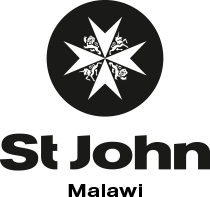First aid is the core activity of St John Malawi and it can be described as being a service.
Commercial First Aid
These are income generating training courses that target some individuals, institutions and companies for a small fee for St John to cover operation costs. The courses are conducted by highly trained and qualified trainers to maintain the global St John quality standards for trainees.
Schools Program
St John Malawi has first aid in schools programme as charity and its objective is to create a future generation that will have first aid knowledge and skills; and reduce the current lack of proper care to the injured, ill people, and loss of lives in an emergency.
After completion of the course in schools, first aid clubs are established, and some participants became either brigades or volunteers of St John and retained as part of St John family promoting and practising skills learnt.
First Aid Service
First aid service is provided in the form of charity at public events/meetings, for example at sporting events, crusades and many other events. Volunteers and Brigades, who have received comprehensive and ongoing training, provide first aid services at various events alongside other organisations.
First aid services are also provided to private entities and institutions for a fee.
First Aid Courses
First aid courses at St John Malawi are designed to suit the needs of every working environment, at home and sporting areas. Here are the courses offered:
1- First Aid Course – Level 1
The training delivers an impressive display of capabilities for responding to low-frequency, high risk emergencies that can occur anywhere and at any time. The skillset and knowledge gained translates effectively in the workplace, at home, or anywhere else. Participants are introduced to simulation based first aid training that will make them ready, willing and able to approach emergency situations with confidence.
2- First Aid Course Level 2 & 3
These course levels make participants to be team leaders in an emergency as they acquire higher levels of First Aid skills. Entry requirement: Learner must have a valid First Aid – Level 1 Certificate.
3- First Aid at work (FAW)
This course provides comprehensive set of practical skills needed by First Aiders in most workplaces to become a confident. It gives both the ability and knowledge to deal with First Aid emergencies as per government regulations stipulated in the Occupational Health and Safety Act No 21 of 1997. It meets the standards required to help and comply with Health and Safety (First Aid) regulations.
4- Basic Life Support – CPR/ AED
The course trains participants to promptly recognize several life-threatening emergencies. The program details the Adult and Child chain of survival, providing participants with CPR and essential Cardiovascular Life Support skills, including the operation of an Automated External Defibrillator (AED).
5- Life Saver for Babies & Children
This course focuses on emergency scenarios that face those looking after young children and infants, including day nurseries, child-minders and caregivers of children at home. It also covers common risks in schools/ home.
6- Life saver course for drivers
This course equips road users with the necessary skills and knowledge to administer First Aid during emergency situations on the road.
7- First Aid Training – Refresher
This course provides First Aiders with an opportunity to practice and update their skills as qualified First Aiders at any time while their First Aid certificate is still valid. Employers are required to ensure their First aiders are competent and maintain their skills throughout the three years. This session builds on expertise and confidence by involving participants in realistic situations with simulated casualties.
8- Life Saver International First Aid Course (LIFAC)
This course is designed to meet the First Aid needs to members of the public who want to be able to manage most common injuries and be able to manage those with medical conditions which are prevalent nowadays.
9- First Aid Essentials (First Aid talk)
This is a discussion type of training which covers specific modules or topics as requested by the client. No assessment and No certificates are issued.
10- First Aid Modular.
This course is for clients who cannot attend a full day and need to complete it in 3 or 5 non-consecutive days. The course can be divided into modules, and assessment can be done once all modules are completed.

